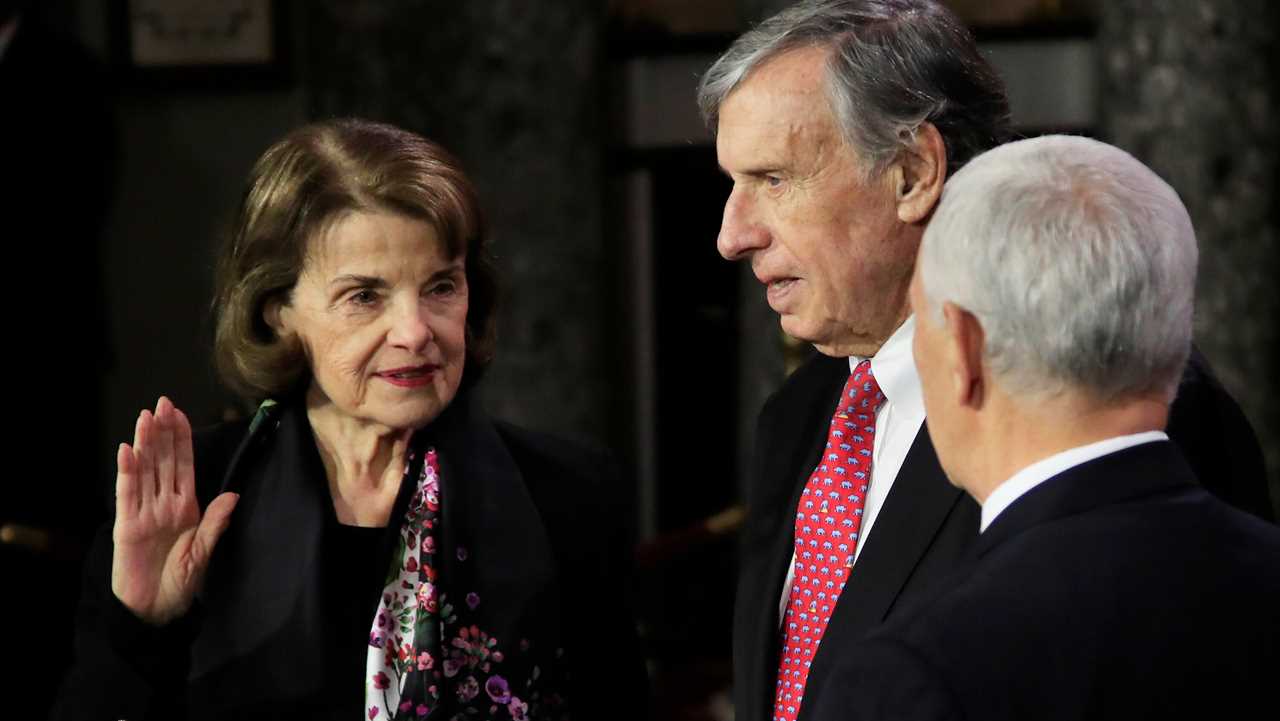
WASHINGTON — Richard Blum, a wealthy investor and the husband of Senator Dianne Feinstein of California, has indicated to President Biden’s advisers that he’s interested in being appointed to an ambassadorship, a move that would renew questions about Ms. Feinstein’s political future.
Mr. Blum, according to Democrats in California and Washington, is eyeing a European capital, a posting that could pave the way for the 87-year-old Ms. Feinstein to leave the Senate. In November, she agreed to relinquish her ranking position on the Judiciary Committee under pressure from Senator Chuck Schumer, now the majority leader, and other Democrats.
Should Mr. Blum, 85, be appointed and Ms. Feinstein join him overseas, it could solve an increasingly awkward problem for Democrats.
Senior party officials have been blunt in private about what they describe as the senator’s diminished acuity and are eager to replace her with a Black woman, of which there are none in the Senate after the departure of Vice President Kamala Harris.
Progressive Democrats have also suggested that Ms. Feinstein’s decorous approach was ill-suited for dealing with the increasingly acrimonious partisan politics in Congress. They were particularly upset during the Supreme Court confirmation hearings of Justice Amy Coney Barrett last fall when Ms. Feinstein praised the way Republicans had handled the hearings. Soon afterward, Mr. Schumer and other Democrats persuaded her not to seek the leadership role on the Judiciary Committee.
On Tuesday, Ms. Feinstein was emphatic that she would serve the remainder of her term, which lasts until 2025, and brushed aside questions about her fitness.
“Absolutely,” she told reporters in the Capitol when asked if she was able to serve fully. “I think that’s pretty obvious.”
But some of her own Democratic colleagues have been raising concerns for months about what they perceive as Ms. Feinstein’s decline — though always beneath the cloak of anonymity to avoid publicly nudging a pillar of the Senate, and one of the most prominent women in American politics, toward the exits.
Mr. Biden has not been involved in any effort to sideline Ms. Feinstein. He has a longstanding relationship with her and Mr. Blum, who hosted a fund-raiser for Mr. Biden at his and Ms. Feinstein’s San Francisco home in 2019 Ms. Feinstein expressed her support for Mr. Biden’s presidential bid early and pointedly dismissed the candidacy of Ms. Harris, then her fellow senator from California, noting that Ms. Harris “is brand-new here” in the capital.
Mr. Biden, according to White House aides, is open to appointing Mr. Blum to an ambassadorship, which is among the most coveted positions in any administration. After prioritizing the appointments of their West Wing staff and the cabinet, the president and his top advisers have only recently started considering whom to dispatch overseas.
One potential ambassador, speaking on the condition of anonymity to discuss a sensitive topic, said Mr. Biden himself wants to pore over the list of potential appointees and does not feel rushed.
There is, however, rising impatience among the would-be envoys. Former senators, including some who served in the Senate with Mr. Biden, are particularly eager to gain some clarity and have taken note of how few in their ranks have joined the administration to date, according to one prominent Democrat who has spoken to them.
The president, himself a former chairman of the Senate Foreign Relations Committee, is attempting a delicate balancing act: rewarding loyal donors and former colleagues without flooding the diplomatic corps with political appointees, as some of his associates thought former President Donald J. Trump had done.
Former senators who could be named as ambassadors include Jeff Flake, the Arizona Republican who backed Mr. Biden; Joe Donnelly of Indiana; Heidi Heitkamp of North Dakota; Ken Salazar of Colorado; and Christopher J. Dodd of Connecticut.
It’s not just former members of Congress looking for positions. A handful of current lawmakers are still hoping to join the administration but are waiting because of Mr. Biden’s own deliberations and the Democrats’ narrow majorities. For example, Representative Dina Titus of Nevada, an early Biden supporter, is hoping for an ambassadorship, but there are currently three Democratic vacancies in the House, where the party holds a slim majority.
Mr. Blum’s desire for an ambassadorship could prove consequential, though. Gov. Gavin Newsom of California, facing an increasingly likely recall threat and eager to energize his party’s base, pledged in an interview with MSNBC’s Joy Reid on Monday night that he would appoint a Black woman to replace Ms. Feinstein. He acknowledged he had “multiple names in mind” for a vacancy that does not exist.
Asked about Mr. Newsom’s remarks, Ms. Feinstein said that she and the governor — like her a former San Francisco mayor — were “very good friends” and that he hadn’t meant what he said in “the way some people thought.” She said she had not discussed her plans with him.
Mr. Newsom, attempting to tamp down the issue, said Tuesday: “I have zero expectation the senator is going anywhere.” In private, the governor has also expressed skepticism that Ms. Feinstein will voluntarily step down — even if Mr. Blum claims an embassy spot.
However, after Mr. Newsom appointed Alex Padilla to replace Ms. Harris in the Senate, despite pressure to select an African-American woman, he is facing fresh pressure to name what would be just the third Black woman ever to serve in the chamber. There’s a long roster of potential candidates, including a handful in California’s House delegation, like Representatives Barbara Lee and Karen Bass, who expressed their interest in Ms. Harris’s seat.
The senator, who was first elected in 1992, recoils at the suggestion she’s not as sharp as she used to be, and her office continues to churn out a number of policy proposals. On Tuesday, she chided reporters for questioning her on Mr. Newsom’s comments about her successor.
“You’re making a mountain out of a molehill,” Ms. Feinstein said.






